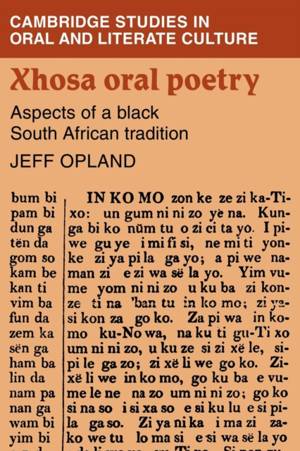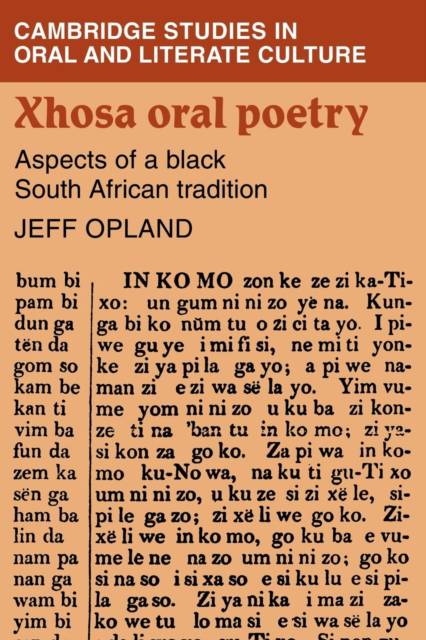
- Afhalen na 1 uur in een winkel met voorraad
- Gratis thuislevering in België vanaf € 30
- Ruim aanbod met 7 miljoen producten
- Afhalen na 1 uur in een winkel met voorraad
- Gratis thuislevering in België vanaf € 30
- Ruim aanbod met 7 miljoen producten
Zoeken
€ 64,95
+ 129 punten
Uitvoering
Omschrijving
The Xhosa-speaking peoples of south-eastern South Africa have a long tradition of oral poetry, extending back at least two hundred years. This book, first published in 1983, was the first detailed study of that tradition. Jeff Opland has assembled a large corpus of Xhosa oral poetry making his the first analysis of an active South African oral poetic tradition to be based on actual fieldwork. The book focuses in particular on the poetry produced by the imbongi, or court poet, and Professor Opland examines the poetry and careers of four such individuals. He describes the imbongi's informal training, the diction of his poetry and its improvisational character and the relationship of the poet to the chief and the community, revealing that the role of the poetry is essentially political. He also considers the nature of the poetry in relation to ritual. His discussion of Xhosa poetry in relation to theoretical constructs of oral poetry and of oral mental processes is an important contribution to the debate about the nature and distinctiveness of 'oral literature'. With its interdisciplinary approach, it will appeal to readers from many disciplines as well as to general readers interested in African culture.
Specificaties
Betrokkenen
- Auteur(s):
- Uitgeverij:
Inhoud
- Aantal bladzijden:
- 316
- Taal:
- Engels
- Reeks:
- Reeksnummer:
- nr. 7
Eigenschappen
- Productcode (EAN):
- 9780521104784
- Verschijningsdatum:
- 19/03/2009
- Uitvoering:
- Paperback
- Formaat:
- Trade paperback (VS)
- Afmetingen:
- 152 mm x 229 mm
- Gewicht:
- 462 g

Alleen bij Standaard Boekhandel
+ 129 punten op je klantenkaart van Standaard Boekhandel
Beoordelingen
We publiceren alleen reviews die voldoen aan de voorwaarden voor reviews. Bekijk onze voorwaarden voor reviews.







